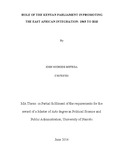| dc.description.abstract | This study sets out to examine the role of the Kenyan Parliament in promoting the East
African integration since independence up to 2010. The study was guided by the
intergovernmentalism theory of integration. In realizing the study’s objectives, the study relied
on secondary data which was drawn from library research of documentary sources of
information. These were readily available in Nairobi and Arusha where the Kenyan
parliament and EAC headquarters are domiciled respectively. The study tested the following
hypotheses: timely domestication of regional protocols by Kenyan parliament leads to a
quicker East African integration process; parliamentary oversight over the East African
integration processes determines the fate of the integration and participation by the Kenyan
parliament in the East African integration process is a manifestation of a representative
process. The study found out that the institution has played some role but could do more if
certain measures are taken to strengthen it. It also found out that the national parliament may
not have had ample space in the EAC integration process due to a domineering Summit. In
addition, it found out that the Kenyan Parliament has played an oversight role that has seen
the process remain on track; EAC institutions strengthened and the due process of the
integration followed. The study concludes that parliament has played a role through a show of
goodwill to other actors like the East African Legislative Assembly. This goodwill is in terms
of material, financial support and timely domestication of treaties and protocols relating to
EAC matters. The study made some recommendations key amongst them being that the EAC
integration process be more inclusive. Indeed, other institutions have also been pushed to the
periphery in the integration process. This made the study to further recommend that more
studies be done on the effectiveness of national parliaments and other actors in the process of
regional integration | en_US |

